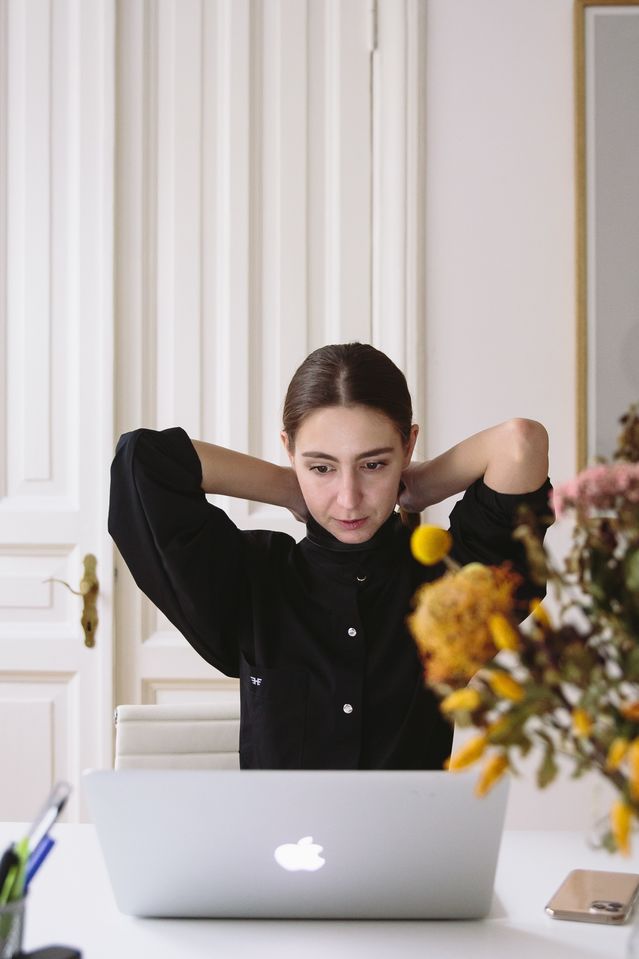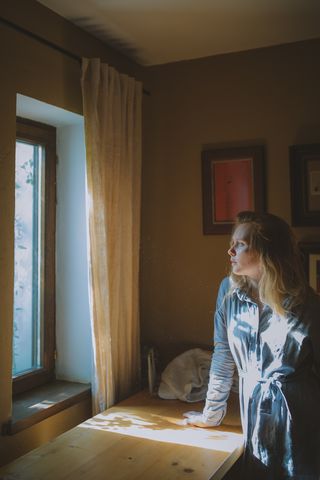Fear
The Fear of Not Measuring Up (in Times of Social Distancing)
Could our fear of social judgment make us lonelier in these uncertain times?
Posted April 30, 2020

Before the COVID-19 pandemic forced us into social distancing, Americans were already grappling with a loneliness epidemic.
- The number of Americans with no close friends has reportedly tripled since 1985. (National Science Foundation Report, 2014.)
- Only about half of Americans (53 percent) have meaningful in-person social interactions on a daily basis, such as having an extended conversation with a friend or spending quality time with family. (Cigna study, 2018.)
- People over age fifty (45 percent) are more likely than younger cellphone owners (29 percent) to feel that cellphone use frequently hurts group conversations. (Pew Research Center Study of 3,042 Americans, 2015.)
- Millennials who describe themselves as lonely report relying more on social media and online connections for companionship. (“Social Media Use and Perceived Social Isolation Among Young Adults in the US,” Journal of Preventative Medicine, 2017.)
- Facebook may make us feel lonely. (Facebook Use Predicts Declines in Subjective Well-Being in Young Adults, University of Michigan Study, August 2013.)
- One in four Americans lives alone according to the US Census Bureau, a 10 percent increase over the past decade. One in three Americans over the age of 65 lives alone. (Health Resources and Services Administration, January 2019.)
Prior to COVID-19, when we felt lonely, we were more likely to turn to online connections as our sole source for companionship, which could lead to more social isolation and then to poor health, mentally as well as physically. It truly was a downward spiral. And worse, the loneliest among us were more prone to judging themselves harshly when others on social media didn’t respond with “likes” or positive comments. A well-known researcher on loneliness, John Cacioppo and his team observed, “Lonely individuals seek to fulfill unmet needs but generally are less forgiving of minor hassles and transgressions than nonlonely individuals.” (Cacioppo, Norris, Decety, Monteleone, Nusbaum, “In the Eye of the Beholder: Individual Differences in Perceived Social Isolation Predict Regional Brain Activation to Social Stimuli,” January 21, 2009, PMC, NIH.)
In short, lonely people can be more sensitive to social judgment and rejection. But now, I wonder if social distancing has magnified their feelings of loneliness as well as their sensitivity to social judgment. And further, are more of us collectively feeling sensitive to the social judgment (or misunderstandings, dismissive remarks, or indifference) of others? Given the heightened anxiety, uncertainty and loneliness of this pandemic, I wonder if we are more worried than ever before about how we measure up in the eyes of others. If we are less able to maintain our normal social bonds through our work, our affiliations, our social life, status, or social events (birthdays, weddings, graduations, holidays) we might be more fearful about social judgment. Indeed, after several hours of dishing out our best behavior on three Zoom conference calls in one day, we not only feel drained, but worry whether we gave the right impression, said the right things, and didn’t make a complete fool of ourselves. Are we doing a good job of convincing others that we are coping well and holding up? Are we worth the invite? It’s high stakes for our onscreen meetings—and relentless performance anxiety takes its toll.
It’s tempting to compare ourselves with one another in these times, particularly on social media. But social judgment and comparing ourselves only makes our loneliness and isolation worse.
The Pitfalls of Comparing Ourselves
In all the research about the ways social media can isolate us, there is a big elephant standing in the room of every study. That big, lurking creature is our deeply human fear of being judged by others. Social scientists have named this fear the “social evaluative threat.” This term perfectly sums up the anxiety-provoking experiences of being evaluated and compared to certain standards of human achievement or normalcy. The social evaluative threat can be truly threatening for us at times, and it can be toxically stressful for our health—our physical health as well as our mental health.
One social psychology professor from San Diego State University in California, Dr. Jean Twenge, has studied just how stressful it is for us to be sized up and compared to others. She is the author of iGen: Why Today’s Super-Connected Kids Are Growing Up Less Rebellious, More Tolerant, Less Happy—and Completely Unprepared for Adulthood—and What That Means for the Rest of Us.
According to her studies and those of other researchers, the stress hormones called catecholamines skyrocket in our bodies when we feel judged, and the levels of catecholamines have been increasing in the past few years, particularly with millennials and Generation Z age groups. We don’t need to have a diagnosis of social anxiety disorder to feel the effects of this rush of stress hormones. Many of us fear being judged when we are lacking in social status or coping with a stigmatized issue (addiction, unemployment, mental illness.) We would rather isolate ourselves than expose ourselves to people who might look down on us. It’s not just a matter of lacking self-esteem or confidence. And it’s not just a matter of self-improvement because, no matter what we do, we live in a world that relentlessly measures us—our actions, our vocabulary, our clothing, our manners, our cars, our spending habits, the tone of our voice, even our facial expressions. Hopefully, amid all that judgment, we’re brave enough to reach out and meet someone who genuinely likes us just as we are.
Social media increases the social evaluative threat to a whole new level of stress, which can be unbearable at times. Social media can make us feel we are being watched and scrutinized as if we’re in a giant fishbowl. We ruthlessly compare ourselves and meticulously make sure we look good and send the right message. We protect and double-check our brand, our image, our every word. We tweak, delete, punctuate with emojis, enhance the lighting and colors, Photoshop, crop, and edit ourselves into oblivion. We can pick from handy menus what to say so it fits the criteria in the boxes for content. Multitudes of people on dating apps or hiring apps will swipe through all that hard work in seconds. And God forbid we mess up and the whole wide world can see it! Or someone who hates us wants to expose our past photos or records for our employers, lenders, or new partners to see. Nothing is sacred and nothing is safe. This is a hard world to be soft in, real in, human in.

We’ve learned the hard way that we must uphold the rules of social media: Be careful, smart, and crafty. Know what you’re getting into. Don’t be too spontaneous, too original, too deep, too intense, too honest—too much! Conversely, don’t bother to put just any old, boring stuff out there if it’s not too interesting for folks to see. So, we censor sharing the unplanned, unexpected, boring-but-happy moments that make us feel human. In short, the culture of social media doesn’t appreciate the fine art of hanging out and being a little goofy. But in our offscreen lives, we need those warm, relaxing nooks and crannies of our days to gather together, out of the spotlight, and into the magic of the moment.
We need a break from being “on” all the time.
Based on social science research about social media as well as my own hard-won observations, the social evaluative threat plays on three common causes of human suffering: stigma, status, and shame. I call these the three Ss. They’re isolating forces that lure us into comparing ourselves with others and drive up our stress hormones when we feel judged.
If we’re suffering from a highly stigmatized issue (addiction, mental illness) or our status is different than others (being broke, unemployed) or we’re feeling a sense of shame or defectiveness, then we’re more vulnerable to anxiety and avoidance of others. And then, according to researchers, we’re more vulnerable to isolation and using social media for companionship— and the spiral deepens ever more viciously as we crave the social media that makes us even more isolated.
When we are going through an isolating period, it might be helpful to check in with ourselves to spot if any of the three Ss are making us feel lonely.
Stigma: We’re isolated because it’s not okay to talk about our issue in most social situations. We must keep it secret and hidden.
Status: We’re isolated because we’ve gotten the message that we’re inferior to others. (Even if we don’t believe we’re inferior, we might be dealing with groups of people who judge us as inferior—or invisible.)
Shame: We believe something is wrong with us. Shame is often the result of internalized beliefs stemming from societal forces of stigma and inferior status.
Isolating Forces that Could Provoke a Sense of Stigma, Status (Inferiority), or Shame
- Chronic or serious illness, chronic pain
- Disability (visual, hearing, mobility, brain injury, developmental, intellectual, other)
- Being a primary caregiver without support (strapped parents, or other caregivers for people who depend on them for their survival)
- Lack of income
- Loss of a job, business, or livelihood
- Living alone, especially seniors
- Language barriers
- Lack of transportation
- Recently relocated to a new city or town
- Loss of a loved one, bereavement
- Loss of any kind, grief (loss of normalcy, sense of purpose, identity, lifestyle, stability)
- Social anxiety
- Divorce or break up
- Empty nest
- Retirement
- Addiction
- Depression and other mental illness
- Lack of a stable home, fear of eviction, or homelessness
When it comes right down to it, survival mode is isolating. Period.
If you checked any situations in the list, it’s plain to see you are in survival mode with a lot on your plate. Please be compassionate, patient, and understanding with yourself while you face the forces that isolate you. While you are holding up throughout these demanding situations, it’s kinder and fairer not to compare your situation to the apparent success of others or the economic advantages of others. (I could make myself miserable by comparing my suffering of the drastic loss of my business to my fellow baby boomers on Facebook who seem to have better safety nets and resources. Or not. If I lock myself in bitterness, it only isolates me further from others.)
Little by little, with acts of kindness for ourselves, we can understand how the demands of survival mode, stigma, status, and shame can grip us while we face the pandemic of COVID-19. Hopefully, we can befriend our loneliness and not feel ashamed of it. We can learn from our loneliness, listen to it, let it call us into action.
I’ll share one brave but enormously rewarding solution I have witnessed that many people are practicing while in lockdown. We can get in touch with people from our past, such as our long-lost cousins, old friends, classmates or former colleagues. We can hunt through our boxes of memorabilia, notebooks, or yearbooks and find old connections. We can make a list of these long-lost folks from years ago and find out how they are holding up. Who knows, but your old classmate from 20 years ago just might welcome your call and enjoy a warm reunion. He might even offer a few tips for how to cope with these chaotic times. And further, you have expanded and strengthened your social network in a lasting and genuine way.
During this pandemic, this is the perfect time to rediscover the people in our lives who liked us long before we ever worried about getting “likes” every day. Now more than ever, when so many of us feel invisible and lost, we just want to know that we matter. With our compassion for the loneliness of one another in these times, we have the power to create little sanctuaries of belonging, just by checking in.




